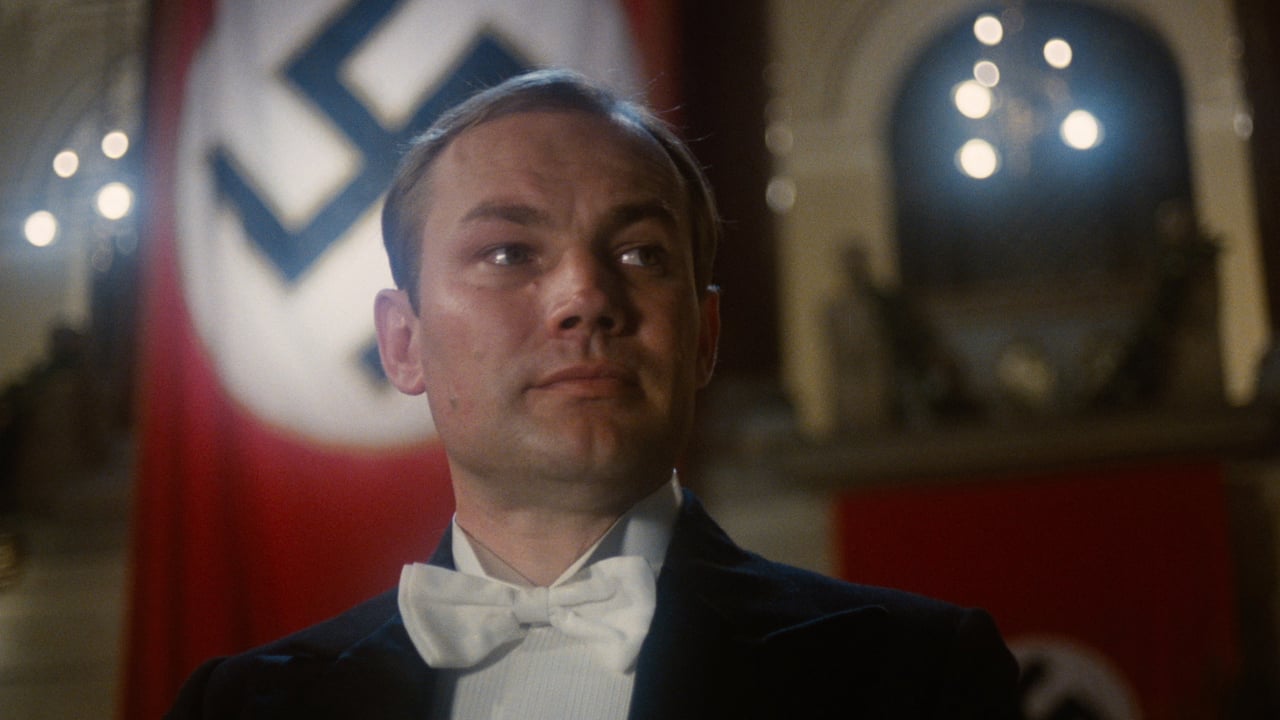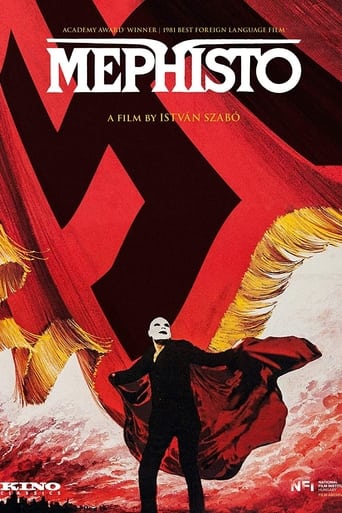

Wonderful character development!
... View MoreWhile it doesn't offer any answers, it both thrills and makes you think.
... View MoreAfter playing with our expectations, this turns out to be a very different sort of film.
... View MoreI didn’t really have many expectations going into the movie (good or bad), but I actually really enjoyed it. I really liked the characters and the banter between them.
... View MoreMephisto is a German film by a Hungarian filmmaker István Szabó. It was received very well since it won an Oscar for Best Foreign Film and an award for Best Screenplay at the Cannes Film Festival. It's a historical film which takes place at pre-WWII Germany, during the rising of the National Socialists. Even though its references to the epic tale of Faust are obvious, the film doesn't fall to highlighting nor underestimation of the viewer. It's a clever film, characterized by strong aesthetic styling, about art, evil and people living in the shadows of power.A German stage actor Hendrik Hoefgen has to choose between his political ideologies and his career when the Nazis win the election in the year 1933. He has to abandon the left-wing circles in which he has been working before. He's a married man but has an affair with a black German woman. Germany wants to destroy all arts that aren't truly German, due to which Hendrik gets the role of Mephisto. He has to keep playing this role which is in the popularity of the Nazis, in order to keep his highly valued status. Faust is Germany's national epic which is an ancient folks tale but generally known as written by Johann Wolfgang von Goethe. It's a story about a man who sells his soul to the Devil. Quite an eternal tale; Faustian contracts are signed every now and then in the modern world. Mephisto is a fictional character in the book. He wagers with the archangel Gabriel that every man can be enticed to join the dark side. Gabriel chooses Faust, a religious servant of God, as their target of the bet. Mephisto sends a plague to Faust's village and the villagers ask for a helping hand from him. But Faust is unable to help the villagers because God doesn't answer to his prayers. Totally desperate, Faust resorts to Mephisto the demon. Mephisto agrees to help but at the same makes him an offer -- eternal youth with all its pleasures. In order to attain this, Faust must sell his soul.This is how the story goes or at least the original folks tale with which I am more familiar with, compared to Goethe's book. But back to the film. Once, when Hendrik has just performed at stage as Mephisto, he goes up the stairs to the box seat of a Nazi general. The general flatters him and they talk a little. The audience turns around and starts staring at them. The play is no longer performed at stage but in the seats, in the life of the real characters of history. This is the scene where fiction becomes reality. The camera takes a long shot of the theater hall as Hendrik, or Mephisto as the general calls him, shakes hands with the general -- a Faustian contract has been signed.To my mind, the film realized brilliantly how to use the face of Mephisto. First on Hendrik, then on the German officers around him and then on his wife. The face equals the mark of evil. It represents something Hendrik has now turned into. And, in the final scene, he runs to the field, followed by the spotlight, stops and says: "What do they want from me now? After all, I am just an actor." This reminds one of the actual events that occurred after WWII. The trial of Nurnberg for instance, and other smaller trials. Many artists were accused for working for the Nazis. But Hitler's propaganda-filmmaker, Leni Riefenstahl, for example said that she only made movies, nothing else. So is one either part of the solution or part of the problem? The themes of evil, art and inner darkness characterize this aesthetically stylized historical war film. The face of Mephisto turns into an icon which collects symbolic meaning to itself. It's a mask, so what do we find behind it when it is dropped down and the truth is revealed. In the end, when the camera takes a freeze-frame shot of Hendrik's face, we see the truth. The artificiality, the illusionary world and the facade are now destroyed. We see the protagonist as a human being begging for mercy. But not only the face of evil and society are revealed, also the faces of fiction, art and cinema.
... View MoreMuch is said of Brandauer's performance here and it is an actor's performance par excellence: look at me, look at me, I am so good, and don't turn away, look at me again. In this respect he is like Robin Williams in one his manic performances which also craves attention and while Brandauer is a brilliant stage performer - the scenes of him on stage are amongst the best in the whole film - his stage-bound acting style in most of the rest of the film is like some psychopath with ADD.This gives the film problems because it fails to build empathy with his ordinary situation: how to deal with an evil government and have a conscience. This problem is compounded by the close up camera: we are always looking at his face in some unendurable clinch as he tries to kiss us and ask us how good he is again and again.The other weakness is the long build to the story. The film takes 40 minutes to become interesting; the preamble is just Brandauer's character being selfish and self-absorbed.
... View MoreI originally saw this film in theaters when it came out, and enjoyed it greatly. A few years later, I saw a dubbed version and was very disappointed. Hoefgen's voice had been dubbed by someone who injected an arch and sarcastic tone, whereas in the original German version, his voice sounded so simple and innocent. (And, of course, the Mephisto sequences lost a great deal in translation).To be brief, the contrast between Hoefgen's ready protestations of innocence, and the evil that he is supporting are meant to make us ask how we can judge the quality of a man's actions. If we cannot rely on our impression of his honesty, then we must use the consequences of the actions as our yardstick.It may not be coincidence that this study of an actor's facile slide into fascism came out early in the Reagan administration. Reagan professed his astonishment over Iran-Contra, protestations that were laughable, as he had all but announced what his government was doing. His act wore thin, but not before it reduced the American presidency to a joke; how else can one explain the reelection of Bush II, all hat and no brains, to a job for which he has proved himself incompetent on a daily basis?
... View MoreAnother disturbing film about the complicity of ordinary people in fascism, which explores similar territory to "Cabaret", "The Conformist", "The Leopard" and "The Remains of the Day". It argues that fascism demonstrates how difficult it is to separate one's public and private roles and beliefs from politics. The title character, an actor, starts to realise how his "make believe" public role has very real, tragic consequences. In this sense, the film has merit beyond its superb acting and other technical features: it subverts the liberal pieties of Hollywood drama which resolve all conflict within the confines of the existing social system. It undercuts the banality of much film criticism which says it is "just entertainment" with "no subtext"- as if produced in a social/historical vacuum with no point of view. In short, the film argues that artists, like everyone else, have to take some responsibility and assume a critical role or risk being haunted, like Mephisto, by the awareness that they have become pawns in a dangerous game.
... View More